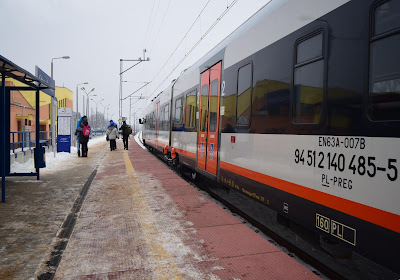This train arrived punctually at Starachowice, where I had a second breakfast at the Bar Miś near the station (scrambled eggs and ham, small salad, brown bread, and ground coffee, all for 8zł - £1.57). A walk to the Zone, I met up with colleagues from our Kraków office for another coffee and carrot juice before the meeting.
Below: Skarżysko-Kamienna railway station. An interesting junction town with a history of manufacturing. Just before daybreak. Time for a walk around.
Below: this magnificent beast is a Pt47, a Polish-designed and -built fast passenger locomotive. This example has been preserved, and this location shows it off nicely. Note the water pipe to the left.
Below: front view of the engine, which was in mainline service into the 1980s. The semaphore looks particularly effective, and helps evoke an era in Polish railway history.
Below: rear three-quarter view showing the original tender; these were mostly replaced in the 1970s
Change of era on the rails - I board the 08:11 service to Ostrowiec Świętokrzyski, calling at Starachowice. This is a Polish-designed and -built Newag Impuls, newly in service with Przewozy Regionalne. Below: the train's seating is like that of a passenger jet. This is the age of the train.
Below: I arrive at Starachowice. I am minutes away from breakfast and a strong, black coffee.
Below: on the way back, I walk into Skarżysko-Kamienna from the hotel in which we had lunch. I'm passed by a somewhat older Przewozy Regionalne train, heading for Kiece. In the distance, a girder bridge spanning the Kamienna river.
Below: sunset at Skarżysko-Kamienna, looking over the tracks from the footbridge. Soon, I'll board a northbound train for Radom, changing there for a slow local train back to Warsaw via W-wa Jeziorki.
This time last year:
The world mourns the loss of David Bowie
This time three years ago:
Where's the snow?
This time five years off:
Two drink-free days a week, British MPs urge
This time six years ago:
Depopulating Polish cities?
This time seven years ago:
Powiśle on a winter's morning
This time eight years ago:
Sunny, snowy Jeziorki
This time nine years ago:
Eddie's giant soap bubble














5 comments:
The Pt47 has only been in Skarżysko-Kamienna for about 4 years. It has had a chequered life since withdrawal, and was dumped in Kraków Płaszów for a number of years. Check out Tomislaw Czarnecki's website for more details.
http://tomi.holdys.pl/index2.php?desc=on&par=pt47-13
Errrr. Impressive.
The post is an excellent illustration of a business traveller's mindset. If any of my workmates (having a driving licence and not afraid of taking longer trips behind the wheel) was to get to Starachowice and pitch up there at 9:00, none would choose to go by train, if a door-to-door journey lasts two and half hours (assuming you stick to speed limits) and they could leave home some two hours later than you (and would be spared the sight of old engines).
BTW, what was the total cost of all train tickets?
PS. I thought for a few years now Krakow-bound trains have not run via Piaseczno... Or is the night train an exception?
@ John Savery
Many thanks for link - shame it's no longer in steam, but compared to the Tkt48 in Kępno, it's in good condition.
@ student SGH
Total cost of tickets - six złotys-something for return from W-wa Jeziorki to 'Setchno, 50 złotys-something for return from 'Setchno to Skarżysko-Kamienna, eight złotys-something for return from Skarżysko to Starachowice. All in all less than 70zł. How far would 15 litres of Pb95 take you?
Since tracks were doubled up again between Okęcie and Piaseczno, more and more long-distance trains have been returning to the Radom line. More to follow once the whole line is complete, but that as we know will take many years.
15 litres of unleaded petrol - with economical driving (given roads and weather accelerator pedal would not to be pressed gently) my car would consumer six litres per 100 kilometres. This gives 250 kilometres driven, while the distance between Jeziorki and Starachowski is, according to Google Maps, 158 kilometres. Then it looks like the cost of travelling by rail is 75% of car trip (excluding a vehicle's wear and tear).
The proper benchmark for a company paying the travel expenses is the mileage allowance, here 320 kilometres times 0.8346, that is two hundred sixty something zlotys, 200 zlotys or four times more!
The first and last time I disembarked at Skarżysko-Kamienna, back in the summer of 1986, my train was hauled by Pt47-136. It was the Sofia-Warsaw express, steam hauled from Premyszl to Skarżysko-Kamienna, and the last steam-hauled international express train in Europe. I timed it running up to around 100km/hr. From there I travelled to (if I remember correctly) Kielce behind a Ty2 where I fell in with a great bunch of students. There were Ty51s around too, but I didn't manage to travel behind one. Various Ol49s provided snappy haulage on other lines.
There was also an overnight train between Warsaw and Zagorz that changed traction four times, with a Pt47 between Skarżysko-Kamienna and Debica, a Ty2 between Rzeszow and Jaslo, and a pair of TkT48s between there and Zagorz. From there it was TkT48 haulage to Nowy Lupkow for the narrow gauge Bieszczady line, which was diesel by then.
I really should return and sample these modern trains, and of course explore today's Poland.
Post a Comment